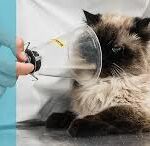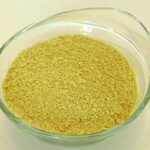This human affliction can also leave your cat short of breath – here’s what you need to know about asthma in cats.
Just as humans can have asthma, felines can, too; knowing the symptoms of this chronic condition and what treatments are available will allow you to give your asthmatic kitty the best quality of life possible. Continue reading to learn more about cat asthma so that you can pinpoint symptoms and get your pet help as soon as possible if he begins showing signs of the disease.
What is Asthma?

Asthma is also referred to as Feline Bronchial Disease. It is an inflammatory condition that affects the bronchi of felines, and the inflammation itself is what is so damaging because it obstructs airflow, fluid buildup, and a thickening of the mucous glands along the airways.
What Causes Asthma?
The inflammation associated with asthma occurs due to an allergy of some kind. For example, airborne pollen is one of the common triggers. However, exposure to mould and dust consistently can also lead to asthma, especially because cats spend much of their time very close to the ground, where these allergens can be collected. Other triggers, however, can include food allergies or sensitivities to environmental chemicals or products used throughout the home.
What are the Symptoms Associated with Asthma?

The typical symptoms associated with asthma include difficulty breathing, coughing, wheezing, purplish or bluish gums, an unwillingness to move, or hiding behaviour that is not normal for your cat.
If your cat exhibits any of the symptoms associated with asthma, you should have him examined by a veterinarian right away. Many symptoms mimic other diseases, such as heartworm or other respiratory ailments. Therefore, a definitive diagnosis from your vet will prevent excess worry and stress while ensuring the most effective treatment options are used to relieve your cat and prevent complications.
It is also important to note that secondary infections, particularly pneumonia, occur in about 24 to 42 per cent of felines suffering from asthma, so keep an eye out for new symptoms that would alert you to these secondary infections.
What are the Treatment Options?

Conventional veterinarians will often prescribe antihistamine and corticosteroid medicines. Bronchodilators are also prescribed. Corticosteroids are usually given by injection, by mouth, or a combination of the two. The injections themselves can be long-lasting or short-acting. However, these drugs have side effects that can occur both in the short-term and in the future, and some side effects can be severe. Therefore, you may go with short-term fast-acting corticosteroids. Discuss your options with your vet, who would know what is best for your cat.
A holistic vet will also consider incorporating herbs and homoeopathic remedies chosen based on your cat’s specific needs and overall constitution to increase the odds that they will be effective. Herbal remedies include boswellia, coltsfoot, cat’s claw, feverfew, ephedra, German chamomile, garlic, ginkgo biloba, lobelia, turmeric, and liquorice. Improving your cat’s diet can also help. Other natural treatments include supplementation with omega-3 fatty acids and certain vitamins and minerals with high antioxidant content.
Minimizing triggers is also a key component in helping to prevent asthma attacks if your cat has been diagnosed with this condition:
- Do not smoke in your home.
- Remove dust and ensure no mould is growing anywhere in your home.
- Reduce or eliminate artificial fragrances, from perfumes to air fresheners and hair spray.
Final Thoughts :
If your pet is suffering from an asthma attack that he has never had before, or you are unable to use the treatment options provided by your vet to control an attack, get your pet to the vet right away. On the way to your vet’s office, keep your pet as calm as possible, placing him in a carrier while ensuring his breathing is not restricted. Human inhalers should never be used on your cat, but if your vet prescribes a feline-specific inhaled medication, use it immediately.





























































